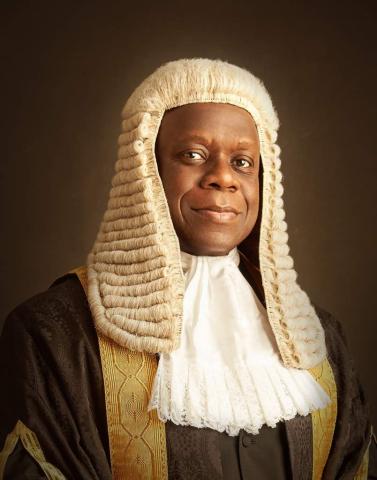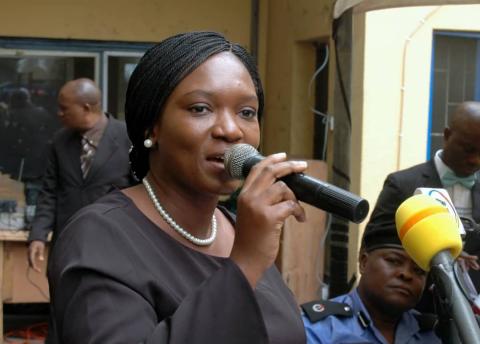
The domino effects of justice delayed or denied for victims of rape and defilement are morbid and horrifying really—both in terms of economic and social cost. And not a few are ambivalent about the preparedness of the Lagos State government to cope with the huge cost of having their streets and highways fizzing with scattered brains.

Rapists and pedophiles are ravaging lives in Lagos State. Blame the slow judiciary, and police prosecution hamstrung by systemic failures, reports Gbenga Ogundare
The phone rang again—making it the third time in a series of intermittent interruption since the reporter arrived at the Domestic and Sexual Violence Response Team office in Alausa, Ikeja.
“Hello doctor,’ Titilola Vivour-Adeniyi ruptured the interview session, pleading, ‘is it possible for someone to help copy the medical report from the triplicate so the officer can have it, and sign for it. They are charging the case to court today,’ Vivour-Adeniyi instructed.
Setting is Lagos—a state notorious for its spiraling rape atrocities in Nigeria. And the woman, Vivour-Adeniyi, is the Coordinator at the Domestic and Sexual Violence Response Team, DSVRT, where responding to unrelenting gender-based violence emergencies across the length and breadth of the densely populated city--including sexual assaults, medical reports lost in transit enroute the police station and sex offenders disappearing out of sight before they are arrested--has remain a critical part of her everyday itinerary since 2014when the initiative started.
It’s impossible not to be so utterly flustered really. Incidence of domestic and sexual attacks in Lagos has shot up over time—from 526 rape cases recorded in 2014 to 2,356 reported cases in 2018. That’s 1,830 or 448 percent spike in just four years. And 1,312 or 225 percent rise between the 2018 incidence and the 1,044 cases recorded in 2017.
Over 170 rapists and pedophiles also have their names listed already in the register of sex offenders created in 2014 to shame sexual predators in the state.
At least, the DSVRT also responds to an average of 150 new cases monthly, disclosed Lagos State Attorney-General and Commissioner for Justice, Adeniji Kazeem.
But that’s as far as the records at the DSVRT and Directorate of Public Prosecutions can reveal. According to Omotola Rotimi, Director of the Office of Public Defender, between January and September 2015 alone, the OPD handled about 70 child defilement cases and 406 rape cases. Another 1,143 of such cases, Rotimi revealed, were treated between 2007 till 2015.
Grim as the statistics appears, lawyer and human rights advocate, Itoro Eze-Anaba says more attacks are stifled daily and buried in the labyrinth of ineffective legal process and cultural sentiments in Lagos.

Such discrimination in law and practice against women and girls are not rare across the country though.
“Majority of the perpetrators of rape and defilements are either neighbours or families of the victims who are suppose to be protecting them in the first place,’ the Founder of the LASUTH-based Mirabel Centre, and Executive Director at Partnership for Justice, told the reporter.
“So you find out that when this incident happen, the perpetrator brings community leaders, clerics and family members to plead on his behalf and persuade parents of the victim to drop the case.
“And if the father who happens to be the breadwinner of the family is the culprit here, it becomes even more difficult for the mother to bring in the police or seek to get justice for her child because she is persuaded that she needs the same man to fulfill his responsibilities at the home front. And this can’t happen if the man is in jail.”
Eze-Anaba is spot on. Gbemileke A. and Oladepo O., in their research entitled: “A Five Year Analysis of Police Record on Sexual Related Offences in Lagos State”, http://www.bioline.org.br/abstract?id=md15014&lang=en shows that a total of 691 sexual offences were reported between 1999 and 2004, with rape accounting for 40.1 percent of the offences.
Forty-four percent of the crimes were committed at the perpetrators houses, and virtually in all, 98.4 percent of the victims were female whose ages ranged from four to 56 years, while 42 percent of victims were mostly neighbours to the perpetrators.
Slow law at work
The combined intervention of the DSVRT and Directorate of Public Prosecutions in Lagos is churning out some convictions all the same—even though replete with frustrations, according to the DSVRT Coordinator.
“We have secured more convictions this year alone,’ Vivour-Adeniyi informed the reporter, ‘but that’s not to say we are where we should be yet as far as stemming the tide of sexual violence in Lagos is concerned.”
Lawal Kamoru is one of such data in the statistics of rape convictions Vivour-Adeniyi and the DPP have secured at the Lagos High Court. The 22-year-old baker got a 13 years sentence in June 2019 after Justice Raliat Adebiyi found the convict guilty of defiling a 14-year-old girl.

Though Section 137 of the Criminal Law of Lagos State 2015 provides that “any person who has unlawful sexual intercourse with a child is guilty of a felony, and is liable to imprisonment for life”, Kamoru nonetheless got his lean sentence five years after he unleashed his attack on the victim.
Investigation at the court registry shows that the convict and three others at large, had on February 1, 2014, gang-raped the victim inside an uncompleted building on Oluwanishola Street in the Ilaje, Bariga area of the state.
Kamoru wasn’t the only beneficiary of that warped jurisprudence in the Lagos judiciary. Edet Imoh, in suit number LD/6279/2017, also reaped from the failure of judges to apply the maximum sentence in sexual assaults. For raping a 40-year-old sex worker in 2018, Imoh would only spend five years in jail after which he can then come back to the street a free rapist. That was a verdict in June 2019, courtesy of Justice Sybil Nwaka of the Sexual Violence Court.
In Lagos, the Criminal Code Law (2011), in Section 258 (1) provides that: “any man who has unlawful sexual intercourse with a woman or girl, without her consent, is guilty of the offence of rape and liable to imprisonment for life.”
Rape convictions at the Lagos High court are painfully marginal apparently, placed side by side the huge tome of charges waiting in the dockets of their Lordship, investigation shows. In 2017, according to Babajide Martins, Lagos State Deputy Director of Public Prosecution, the state only managed to secure just three convictions out of the 1044 cases recorded in 2017. It was another 15 meagre convictions the following year, which is again less than two percent of the 2,356 rape cases recorded in 2018.
But wonder not far. Getting justice for survivors of rape and defilement in Lagos can be slow and nauseating. “It takes up to two or three years on the average, and that’s even fast because of the Sexual Violence Court,’ Vivour-Adeniyi disclosed.
That’s not to say other courts are not prosecuting rape cases too, the reporter found out. In fact, Justices Hakeem Oshode, Atinuke Ipaye and a few other Judges in the Lagos High Court who have criminal jurisdiction have delivered judgments ranging from life sentence to 60 years jail term in recent time.
March 20, 2018, a 35-year-old man, Okechukwu Nwachukwu, was sentenced to life imprisonment by Justice Josephine Oyefeso for defiling an eight-year-old child in 2014.
Nwachukwu was accused of defiling two girls, aged 7 and 8 initially, but the prosecution could only secure conviction on one.
During the trial, a medical doctor at Mirabel Centre, Lagos, who conducted test on the girls, confirmed that one of them had bruises in her private part, while the other had none.
A gamut of reasons can as well motivate delays in the prosecution and administration of justice in rape trials in Lagos. For one, the courts are congested, and judges are ladened beyond tensile limit, explained Vivour-Adeniyi.
And that’s not exactly untrue really. Investigation at the courts shows that Justice Sybil Nwaka of the Sexual Violence Court currently has over 600 cases inundating her lordship. Ditto for Justice Abiola Soladoye, also of the Sexual Violence Court too. She also has over 300 pending charges to contend with already, the reporter found out.
And then, there is the victims’ disposition, which is largely impelled by their distrust of police prosecution and the judiciary. This, in addition to the social stigma associated with being a victim of rape, thus provide a disincentive for rape victims who desire to make public their experiences of sexual violence in other to get justice, Eze-Anaba groaned.
“Cases stay so long in courts that parties are tired and see it as a waste of time. Even the police are not equipped to source and provide evidence in court and survivors are pressurized to drop the cases,’ she griped.
Bureaucracy in prosecution

The sloppy criminal justice processes is too glaring to discountenance in Lagos. Arrest and arraignment of sex offenders at the Lagos High Court is also fraught with an obvious loophole, the reporter discovered, and this administrative inconsistency makes dispensation of justice disconcertingly lethargic.
For one, sex offenders are charged to the Magistrate court initially. That is after the victim must have reported the incident to the police, and they have been able to establish that there was penetration actually through their preliminary investigation, which is further corroborated by medical examination and report, the reporter learnt.
The Directorate of Public Prosecution then issues an advice to the police, either for prosecution or not. The process of advice takes two weeks normally, the reporter found out.
But in Lagos, conviction for rape and defilement carries a life sentence according to the criminal laws of the state, a verdict that is beyond the jurisdiction of the magistrate court where the charge is instituted in the first place, so it has to be transferred to the High Court again, Vivour-Adeniyi explained.
The process of transfer again takes maximum of one month.
The bottleneck then continues at the High Court afresh. Investigation shows that the case has to be listed initially, and from there, wait for assignment to a judge before the offender is then re-arraigned. That process ideally, the DSVRT coordinator explained, eats up another three months.
“But we are not in an ideal situation’, she lamented, ‘what I just recounted can take up to six months or a year.
“Sometimes the defendant may have been released at the magistrate court level. So by the time the judge begins to ask for the defendant and his sureties, they are nowhere to be found.
“But let us just assume that the defendant is remanded and the police are able to produce him at the high court. The trial will begin, and prosecution and defense begin to call their witnesses. And you know lawyers, they like to take advantage of the court by asking for adjournments for diverse reasons.
“And then the courts are congested. These judges have a lot of cases they are dealing with. I know as at 2018, Justice Nwaka has over 600 rape cases in her docket alone.
“Normally, it would have been beautiful if they can sit back to back, but these judges are overwhelmed. So all of these issues contribute to delays in dispensing justice, and that’s why most rape survivors drop out of the criminal causes.
“That’s why most times, we try to engage with the survivors and manage their expectations. Most of them believe that once a suspect is arrested, he is taking to jail straight, but the system is not perfect yet, even though we are striving towards perfection.”
Looking beneath the surface

Investigating and Prosecuting criminal atrocities such as rape and other gender-based violence are the direct responsibility of government—the enforcing arms that fulfill its obligations to protect human rights, and ensure safety, and security of Nigerians.
That role falls on the police—the long arms of the criminal justice system.
And Bala Elkana, Police Public Relations Officer in the state, told the reporter in a chat the Lagos State Police Command is doing just that. Notwithstanding the widespread public pessimism.
July 2019, officers of the state police command arrested four men in different parts of the city, according to Elkanah, for offenses bordering on rape and molestation of minors.
One of the offenders, a 68-year-old Yisah Showunmi, allegedly raped his 15-year-old daughter and her friends.
The girl reported the incident at Imota Police Station in Ikorodu, on June 27. She alleged that her father has been defiling her for the past three years, stating that when her two friends (Names withheld) ages 15 and 16 came to stay in their house, her father also had sexual intercourse with them. The last incident, she narrated, happened on June 23, 2019.
In a related incident, Akin Olatilu was also arrested for sexually abusing his step-daughter. According to the police, Olatilu has been assaulting the victim for five years when she was just 14.
But June 14, the lady approached the Police to make a report, after her mother had refused to take action despite reporting the incident to her.
Another case was reported at the Igando Police station by a mother who claimed that her daughter was assaulted by her guardian, one Pastor Popo Paul, who lives at 10/11 Aminu Street, Ishuti road, Egan Igando, Lagos.
The mother, who lives at Akure in Ondo state, had brought her daughter to Lagos, in 2017, to live with Paul's wife. But she stated that she noticed her daughter was pregnant sometime in June, 2018 and that when she interrogated her, she mentioned the name of the suspect.
According to the pregnant girl, Paul started sleeping with her in January 2018. She gave birth to a baby girl in April 2019.
Aliyu Ali Mohammed was also arrested for allegedly having sexual intercourse with a 14-year-old girl inside an uncompleted building in Peace Estate in the Iba area of Lagos.
According to Elkana, the case was reported by one Harrison Chukwerueke, who caught the suspect.
NGOs to the rescue
The pockets of arrest in recent time is not without the technical partnership of the Justice for All program which inspired the creation of the 15 Family Support Units across police stations in the state, and the European Union-funded Rule of Law and Anti corruption (ROLAC) which helped built the capacity of police officers and other actors impacting on the criminal justice system to gather evidence through effective investigation, Ajibola Ijimakinwa, State Coordinator for the project, told the reporter.

“We have trained 27 Police officers, Ministry of Justice prosecutors and NAPTIP on the provisions of the Domestic Violence Law and Investigating and prosecuting domestic and sexual violence cases.
“But we have a programme operating in Lagos-- New Policing programme that have done a lot of training for FSUs and JWC.”
The impact notwithstanding, not many would cheer the police for their feat. And Josephine Effah-Chukwuma, Executive Director at Project Alert, is one of those ardent crowds of skeptics. January 2019, Effah-Chukwuma led a coalition of NGOs working on Violence Against Women to kindle debates on child sexual abuse and systemic failure in responding to such case.
The tardy intervention in sexual violence cases, according to Effah-Chukwuma, starts at the police station, where officers goad already traumatized victims to fund the cost of investigation and search for justice.
Damning reports
Effah-Chukwuma is not exactly sentimental with her verdict. Police investigations, the Civil Society Panel Report on the Reform of the NPF www.noprin.org/CSO%20Panel%20Final%20Report.pdf says, are hamstrung by a combination of infrastructure dearth, shoddy record-keeping, corruption and incompetence which ultimately make effective prosecution a rarity.
“Another cause of low public confidence in the NPF which came out strongly during the public hearings of the CSO Panel was police insensitivity to the plight of victims of gender crimes such as domestic violence and rape’, the report noted.
“Not only do the police ridicule and trivialize cases of domestic violence and rape reported to them, they go further and blame the victims for their victimization.
The result is a very low rate of reporting of what are known as gender crimes.”
Gbemileke A. and Oladepo O. also threw up these ugly points In their study. Only 47 case files were available for review as most were missing due to inadequate storage, the researchers revealed. Again, a vast bulk of the case files (76.6%) was withdrawn, 12.8 percent was said to be under investigation, while the status of 8.5 percent was unknown since 2004.
It could not have been otherwise, the reporter discovered. The Family Support Units created to deal directly with domestic and sexual violence in the state are handicapped by poor funding and logistic deficit, officers at the FSUs in Idimu and Isokoko Police Stations lamented to the reporter who approached the two stations in the guise of a victim seeking intervention in a domestic violence incident.
A police Station in the state gets between N30, 000 and N40, 000 monthly as running cost, the reporter found out, so the FSUS have no budget of their own, and are left with no option than to run after sex offenders with their money, they disclosed.
The Police spokesperson also confirmed that resources are scarce in the state, compared to the gamut of social vices, such as cultism, kidnapping, armed robbery etc, demanding attention. So you really have to plan and deploy resources effectively, he explained.
“It baffles me sometimes when everybody wants to shift the blame on the police. We are partners and every partner has their own peculiar problems.
“Look we carry the bulk of the responsibilities in gender-based violence. It is the police that initiate the process: use its resources to go after the perpetrators; it is the same police that move survivors to medical facilities; police will mount pressure on doctors to give medical reports in some instances; the same police now will take the matter to court. And most times, it is our prosecutors who follow up on the matter. So the police carry the bulk of the burden from our little budget.
“We deploy the most resources without support from anywhere, not even grants. So when people sit down somewhere and begin to blame the police, I just look at them. If you are allowed to go through half the trouble the police is contending with, you won't survive because your organization will shut down.”
Yet another rape
Logistic deficits, such as enumerated by the Police spokesperson, have a grave spin-off on the administration of criminal justice in Lagos, and anywhere in Nigeria for that matter, Ijimakinwa pointed out in a chat with the reporter.
“It leads to delays in criminal trials; it increases the number of persons in prison awaiting trial; and ultimately impacts negatively on public confidence in the administration of criminal justice,’ the State Coordinator for the ROLAC initiative said.
It also, in turn, contravenes international laws. For one, rape is a form of gender-based violence against women. And the Committee on the Elimination of Discrimination Against Women states in its General Recommendation No. 19 that gender-based violence is a form of discrimination which the CEDAW requires its states parties to eliminate in all its forms.
Nigeria is a state party to this treaty, after ratifying the Convention on 13 June 1985.
Article 4c of the law provides in part: In order to take all measures to eliminate violence against women, States must exercise due diligence to prevent, investigate and, in accordance with national legislation, punish acts of violence against women, whether those acts are perpetrated by the State or by private persons.
But that task requires more funding for the police whose responsibility it is to arrest, investigate and prosecute sexual violence.
“I think partners should contribute resources to address this issue, not just one partner focusing its meager resources because we have other challenges.”
Exactly what Vivour-Adeniyi feels too. “If we get the angle of the police right’, the DSVRT Coordinator explained, ‘we have gotten 60 percent of the criminal justice process right definitely.”
Monday Ubani, human rights lawyer and vice president of the Nigerian Bar Association (NBA) has what it takes to fix the remaining rot. One potent solution will be to review the number of justices in the Lagos judiciary, in addition to creating more judicial divisions, Ubani reasoned.
“Also we need to equip our judicial system with basic infrastructure. It's high time we left the long-hand process we are using in taking notes of proceedings. We should employ technology in the administration of justice. We see how other nations are not taking proceedings in long-hand, rather it is being recorded electronically after which they review and do the right thing.
“Funding is also an issue. If we employ more judges, that means you have to pay more money, you also have to equip the court system and we must also amend some of our rules to accommodate speedy dispensation of justice."
The spin-offs are brutal and grim if the state doesn’t get it right as expected. Mental health experts say that sexual assaults can have serious physical, psychological and reproductive backlash for the victims, including death, unwanted pregnancies, complications in childbirth, and sexually transmitted infections, such as HIV/AIDS.
And so, failure to fulfill the obligation spelt out under international human rights laws such as the CEDAW, for Dr. Charles Umeh, amounts to another violent rape on the psyche of the traumatized survivors. The Clinical Psychologist at the Lagos University Teaching Hospital (LUTH) at Idi-Araba says “the victims feel cheated and hold the belief that the society cannot protect them, and this in turn leads to a feeling of insecurity.
“Don’t forget, women place a lot of value on their sexuality, and if they are raped, they naturally feel that something very essential for their existence has been taken away from them, and this can lead to trauma and loss of self-esteem in the long run.”
It is well documented and widely accepted that trauma also spawn other mental health conditions such as anxiety, irritability and confusion, Umeh explained further.
“And more importantly, the issue of self-efficacy sets in. the reason is because when you feel something important has been taken away from you, then your ability to function effectively in life becomes greatly impaired.”
And for virgins, such as in the case of defilement, according to Umeh, the girls quickly come down with depression, eating disorder, loss of sexual interest and relationship difficulty as they grow up and enter into adolescence. This is also in addition to post-traumatic stress disorder, dissociative identity disorder or what is simply known as split personality that further aggravates mental illness in the victims.
The domino effects of justice delayed or denied for victims of rape and defilement are morbid and horrifying really—both in terms of economic and social cost. And not a few are ambivalent about the preparedness of the Lagos State government to cope with the huge cost of having their streets and highways fizzing with scattered brains.
*This investigation was done with the support of the Premium Times Centre for Investigative Journalism (PTCIJ)